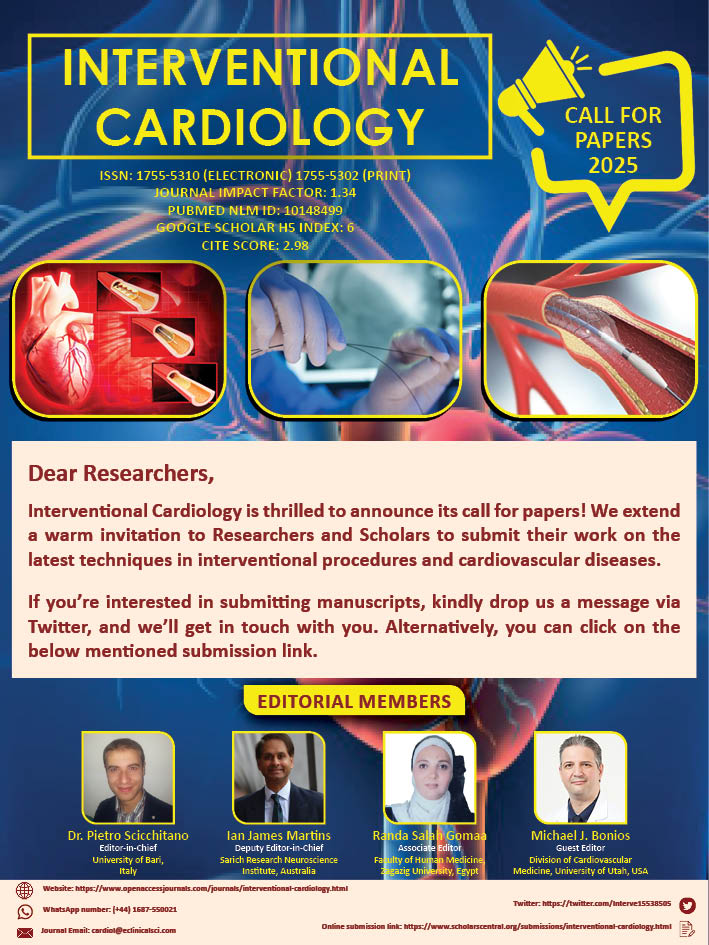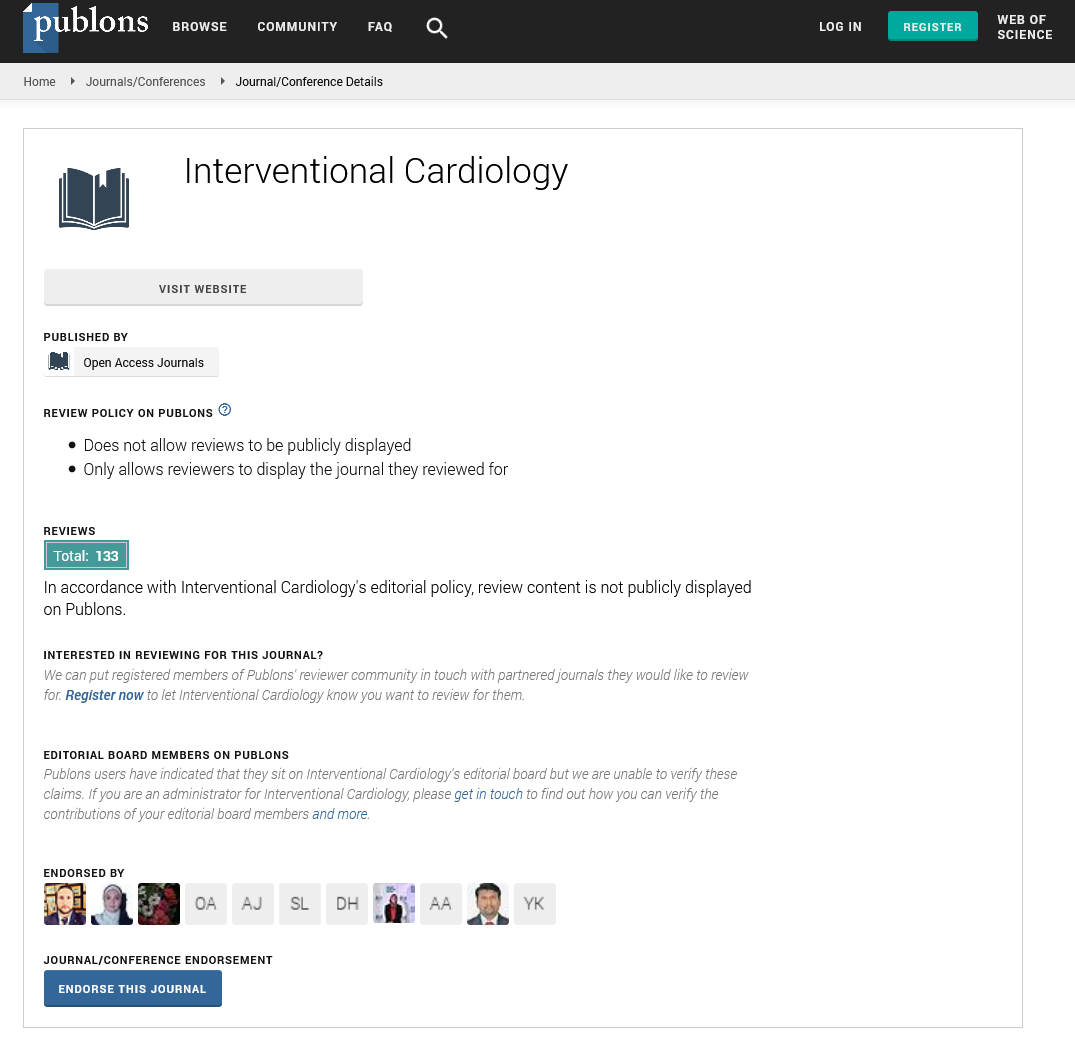Welcome to the Interventional Cardiology Journal
Editorial Board
Cardiology as a field of study has been gaining significant importance due to the increasing financial burden on nations worldwide. Cardiovascular diseases are the leading cause of death globally. Interventional Cardiology is a scholarly open-access journal that provides a platform for scholars, practitioners, and students interested in contributing their findings in this field.
Since cardiovascular diseases can be prevented by addressing behavioral risk factors, the Interventional Cardiology journal covers a wide range of studies, including apical hypertrophic cardiomyopathy, coronary artery ectasia, fetal heart calcification, chronic arterial insufficiency, cardiovascular disease, its association with cancer, peri-arrest period, complications after heart surgery, early repolarization symptoms, coronary arteritis, inflammatory vascular disease, inflammatory cardiomyopathy, systolic pressure variation, left atrium enlargement, and Ventricular Septal Defect (VSD).
The journal presents thoroughly reviewed original research in various formats such as research articles, review articles, case studies, commentaries, short communications, and letters to the editors. Topics covered include the association of Abiotrophia species with heart problems, heart and blood vessel disorders, myocardial infarction (heart attack), issues related to cardiac arrest, stroke, techniques and procedures used in stent implantation, anticoagulant drugs (blood thinners), basic research on heart structure and functions, and other medical conditions and associated treatments.
Moreover, the journal focuses on the latest therapeutic efforts such as the application of cardiac progenitor cells, angioplasty, Percutaneous Coronary Intervention (PCI) like Percutaneous Transluminal Coronary Angioplasty (PTCA), stent implantation, anticoagulant drugs (blood thinners), therapy following open-heart surgery, and the use of ventricular assist devices.
Submit your manuscripts through Online Submission System or directly accpted by Editorial Office at manuscripts@openaccessjournals.com
Interventional Cardiology is listed in the quality indexing sites such as Scopus, EMBASE/Excerpta Medica to increase visibility and discoverability.
Fast Editorial Execution and Review Process (FEE-Review Process):
Interventional Cardiology is participating in the Fast Editorial Execution and Review Process (FEE-Review Process) with an additional prepayment of $99 apart from the regular article processing fee. Fast Editorial Execution and Review Process is a special service for the article that enables it to get a faster response in the pre-review stage from the handling editor as well as a review from the reviewer. An author can get a faster response of pre-review maximum in 3 days since submission, and a review process by the reviewer maximum in 5 days, followed by revision/publication in 2 days. If the article gets notified for revision by the handling editor, then it will take another 5 days for external review by the previous reviewer or alternative reviewer.
Acceptance of manuscripts is driven entirely by handling editorial team considerations and independent peer-review, ensuring the highest standards are maintained no matter the route to regular peer-reviewed publication or a fast editorial review process. The handling editor and the article contributor are responsible for adhering to scientific standards. The article FEE-Review process of $99 will not be refunded even if the article is rejected or withdrawn for publication.
The corresponding author or institution/organization is responsible for making the manuscript FEE-Review Process payment. The additional FEE-Review Process payment covers the fast review processing and quick editorial decisions, and regular article publication covers the preparation in various formats for online publication, securing full-text inclusion in a number of permanent archives like HTML, XML, and PDF, and feeding to different indexing agencies.
h-index
Articles published in Interventional Cardiology have been cited by esteemed scholars and scientists all around the world. Interventional Cardiology has got h-index 15 , which means every article in Interventional Cardiology has got 15 average citations.
Recently Published Articles
Short Communication p. 726-727
Bridging Knowledge and Practice: Lessons from Ghana on Advanced Life Support Among Nurses
Author(s): Gyimaa Nti-Darkwah, Susana Erica Somuah, Amos Prince Otuah, Mary Agongo4
Short Communication p. 712-713
Implementing Simulation-Based Learning in the Training of LVAD Competent Nurses in the Emergency Department
Author(s): Kitzel R. Robles
Heart failure is a progressive disease that affects about 6.7 million people in the United States of America, and it is projected to increase by 46%, affecting more than 8 million people by ..
Research Article p. 1-5
Atrial fibrillation and COVID-19 vaccination: Current understanding and insights from the literature
Author(s): Rosanna Ruggiero*, Nunzia Balzano, Gorizio Pieretti, Federica Fraenza, Consiglia Riccardi, Francesco Rossi, Annalisa Capuano
In the battle against the COVID-19 pandemic, vaccines and mass vaccination programs played a fundamental role in reducing the total number of COVID-19 related severe cases, hospitalizations,..
Case Report p. 714-718
Case Report on LAD Perforation During CTO-PCI Sealed by Coil Embolization
Author(s): Kaisar Nasrullah khan, Ayesha Siddika, Najim Uddin soikot
T he risk of Coronary Artery Perforation (CAP) is high during Percutaneous Coronary Intervention (PCI) for Chronic Total Occlusion (CTO). In cases of large proximal CAP, covered stents are o..
Research Article p. 719-725
Multicenter Comparison of AI Deep Learning Reconstruction, Iterative Reconstruction, and Filtered Back Projection for Coronary Artery Calcification Scoring
Author(s): Alena R. Winkler, June D. Campos, Mark L. Winkler
Objective: To validate the feasibility of AI Deep Learning Reconstruction for Coronary Artery Calcification Scoring in order to decrease radiation exposure on a 4 cm detector CT scanner. Thi..






